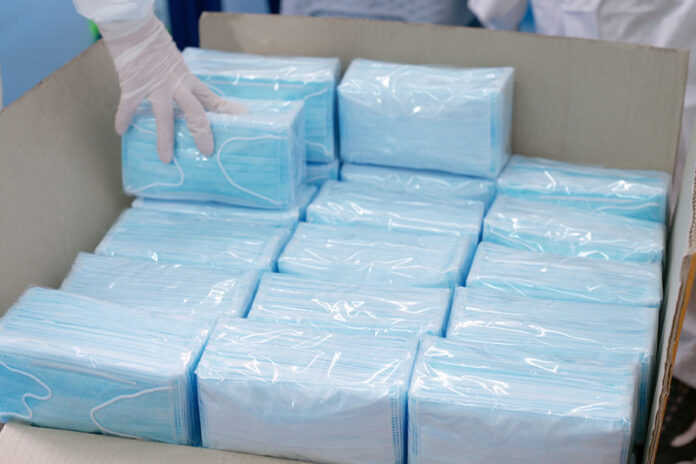The claimant was an international medical service provider registered in the Isle of Man, and the respondent was a professional supplier of medical materials registered in mainland China. In the spring of 2020, at the peak of the global covid-19 spread, demand for medical supplies such as protective masks skyrocketed. In March, the claimant and respondent executed an export contract for the acquisition of certain KN95 facial masks, which set out unit price, total price, date of delivery and quality. Specifically, the contract provided that “KN95 masks must comply with the CE, FFP2 and FDA requirements”. Furthermore, the contract provided that any future dispute should be submitted to the Shanghai International Economic and Trade Arbitration Commission (Shanghai International Arbitration Centre, “SHIAC”) for arbitration.
After executing the contract, following the instructions from the claimant, the respondent shipped the masks to the claimant’s designated locations in two shipments. However, the claimant discovered that the first shipment of masks, destined for Iceland, were returned by clients due to substandard quality and the lack of a CE certificate, while the second shipment destined for Belgium was confiscated by customs due to quality issues.
Learning of the situation, the claimant immediately contacted the respondent and requested the cancellation of the contract, full repayment and compensation for the losses, to which the respondent did not reply. The claimant then applied for arbitration with the SHIAC regarding the shipment to Belgium, withholding legal proceedings for the Iceland-bound batch due to ongoing disputes with local clients. The claimant requested compensation on the defective masks shipped to Belgium by the respondent, and submitted a quality report issued by a Belgian consultant, according to which the masks did not pass the FFP2 test.
HEARING FROM BOTH SIDES
At the centre of the dispute was whether the masks were indeed defective. The respondent referred to the contract requirement, which stated that “the KN95 masks must comply with the CE, FFP2 and FDA requirements”, but argued that CE and FDA are certificates of product safety, not quality; as the disputed masks were for civilian use rather than medical purposes, the FDA approval was not mandatory; and as FFP2, the standard applied in European countries for mask production, demands a protection equivalent to KN95 masks, the disputed masks should instead be subject to the Chinese national standard, specifically GB2626-2006.
When executing the contract, the respondent had presented both civilian and medical CE certificates, thus the claimant was well aware of the certification and recognised them by signing the contract. As for the test report, the respondent argued that the claimant did not obtain its consent when selecting the test agency, hence the test report should not be admitted as evidence.
The claimant, on the other hand, submitted that according to the EU resolution No. 85/C/136/01, the EU direction No. EU2016/425 (PPE) and the FFP2 standard, personal protective masks sold on the EU market must obtain the CE certificate. Although the respondent presented CE certificates, the issuer AS-GCTG was not included in the list of agencies recognised by the EU, thus the certificate had no legally binding force.
OPINIONS OF THE TRIBUNAL
The arbitral tribunal concluded that the core issue of the dispute centred on the interpretation of contractual terms for mask quality. The contract provided that “KN95 masks must comply with the CE, FFP2 and FDA requirements”. However, the masks to be transacted under the contract were not medical protective gear or apparatus, thus did not require FDA approval. The tribunal held that as a Chinese manufacturer, the respondent should ensure that the quality of the masks conformed with the Chinese national standard of GB2626-2006, but it should also obtain the CE certificate and execute the FFP2 standard as explicitly provided under the contract.
The package of disputed masks showcased the CE symbol, which constituted an explicit guarantee by the respondent on the quality of the masks. However, the issuer of the CE symbol, AS-GCTG, was not an EU-recognised agency and the official website of the European Security Council also clearly listed AS-GCTG as an unauthorised agency, invalidating the legal force of its issued certificate.
Additionally, the quality test report issued by the Belgian test agency indicated that the masks did not pass the FFP2 test. The defective masks shipped to Belgium were therefore confiscated by customs and banned from being sold on the market.
As a result, the tribunal concluded that the masks shipped by the respondent to Belgium did not conform to the contractual requirements for quality and certification. The respondent therefore violated the quality provision under the contract and caused the claimant’s inability to fulfil its contractual purpose, which constituted a substantial breach of the contract. In the end, the tribunal awarded full repayment to the claimant.
As for shipping fees, import taxes, warehousing fees, test fees and the purchase commission requested by the claimant for losses due to the shipment to Iceland, since the disputes with Icelandic clients were ongoing, the tribunal decided not to address those claims. The claimant may separately file for such losses when the existing proceedings had closed.
COMMENTS
The arbitration tackles a typical issue in international commercial transactions: the determination of the quality of goods.
In broad terms, standards of goods in international trade may comprise of those of the export country, the import country and those agreed by the trading partners in their contracts. Often, Chinese export companies focus solely on getting clearance from domestic inspection agencies, but neglect the quality standards under their contracts. In this case, the respondent was explicitly aware of the contractual term that “KN95 masks must comply with the CE, FFP2 and FDA requirements”. Nevertheless, it still relied on its defence that the masks were subject only to the Chinese national standard for quality, clearly overlooking the contract.
In the arbitral award, the tribunal concluded that the respondent had violated two obligations: (1) non-conformity to the EU FFP2 quality standard; and (2) failure to provide a credible CE certificate. Export companies should pay more attention to the contracts and strictly abide by their terms, especially concerning the quality of goods.
Although the specifics of the EU FFP2 standard are not substantially different from those of the Chinese national standard, given the scientific complexity of the testing procedures, it does not mean the same product would certainly satisfy both. Therefore, when exported goods are subject to foreign quality standards, it is advisable to explicitly agree on the manner of testing beforehand.
In this case, the respondent contested the admissibility of the test report issued by the Belgian test agency due to a lack of consent in the selection process, but it was not sufficient to overrule the evidential value behind the report.
The admissibility of reports issued by unilaterally appointed agencies is held under different regards between international and Chinese arbitration. In international arbitration, the admissibility of a third-party report does not fully rest on the condition of mutual agreement. Instead, arbitrators usually examine its credibility and reputation.
As a final reminder, export companies should pay attention to the credentials of certifying agencies, in order to avoid potential disputes, thus losses, caused by non-compliance.
Li Tingwei and Wang Yuan are senior case managers at the SHIAC






















